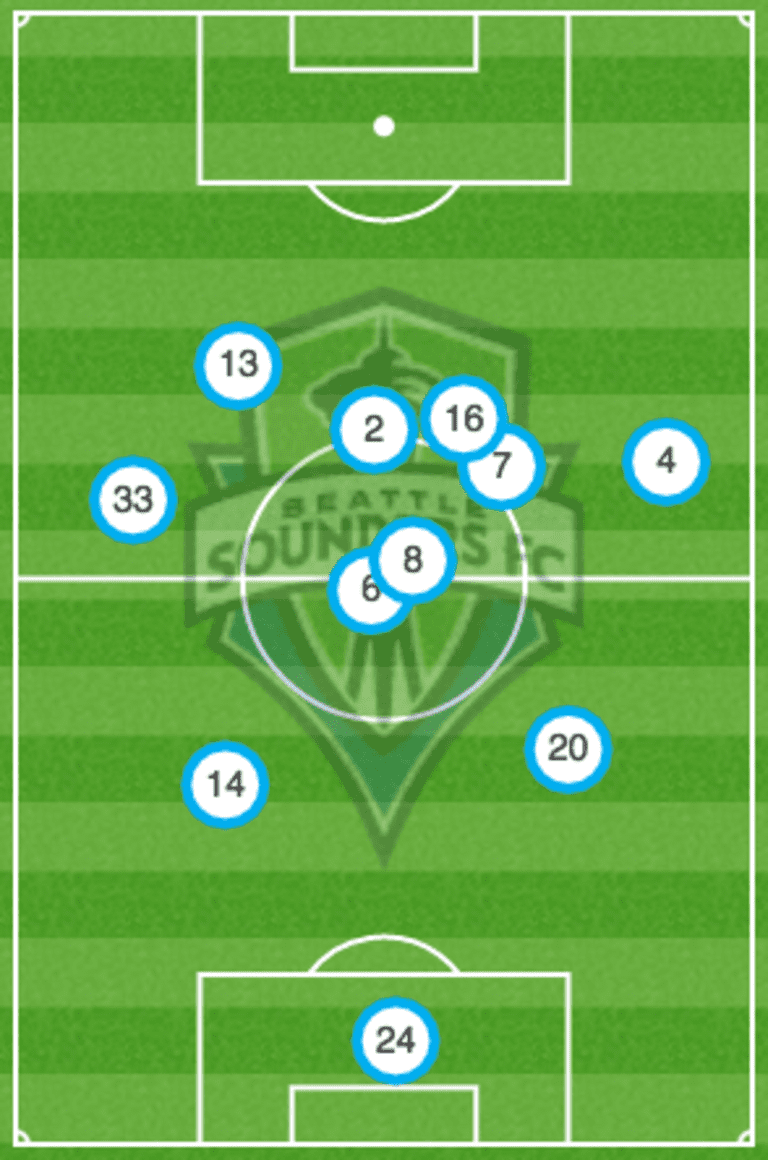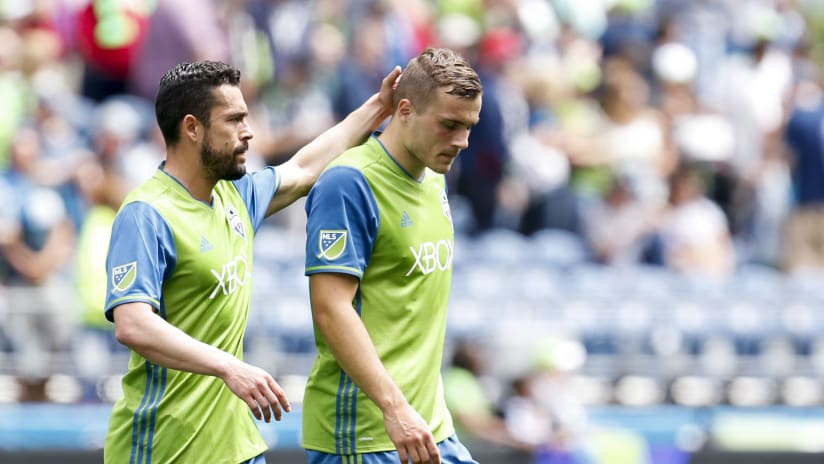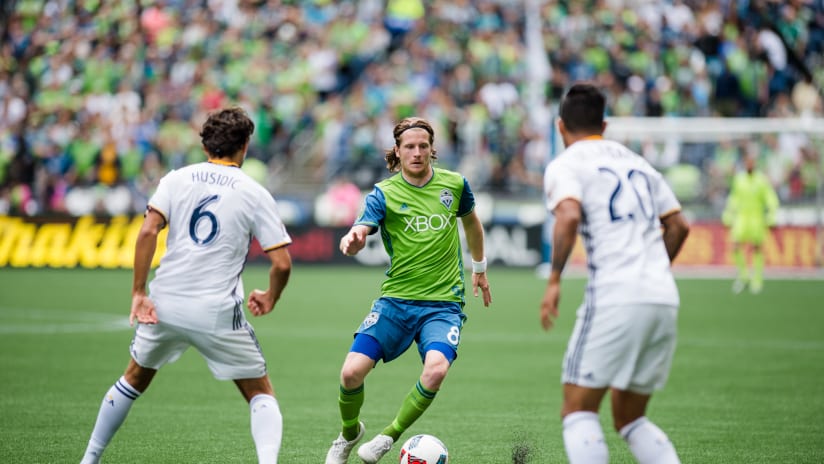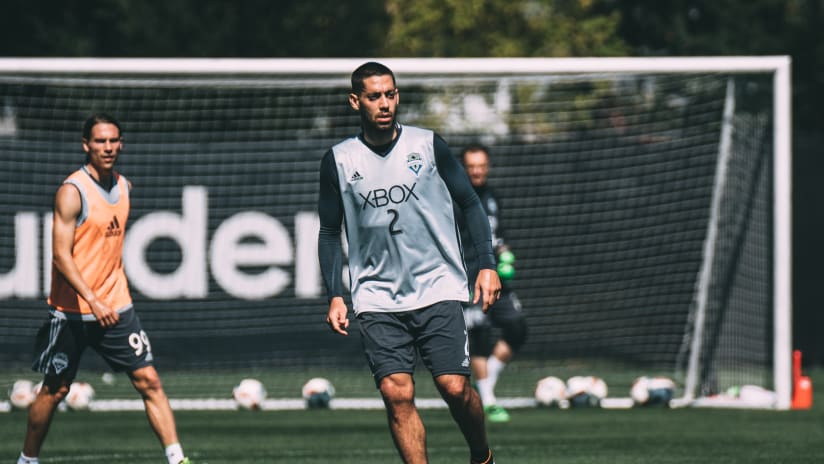SEATTLE — As of Saturday, the Seattle Sounders are halfway through their season and the warning bells are ominously chiming. What’s even more troubling, they are closer than they have ever been.
The Sounders used their battering ram on the LA Galaxy defense so often on Saturday it snapped in half before the doors fell. They racked up a season-high 22 shots, put an incredible 21 open-play crosses into the box, watched Clint Dempsey ding the post with minutes left and still managed to leave without a single goal. Not one. The Galaxy left Seattle 1-0 winners and the Sounders were left with many of the same questions as when they entered.
Where are the goals going to come from, and what will it take to win them?
Saturday’s shutout marked the team’s sixth loss in its last eight games, and the Sounders have managed just one win since the beginning of May. The most galling thing about Saturday’s performance was that, overall, it was largely a good one. Seattle out-passed LA, out-shot them by an unbelievable margin and yet could not cash in. What happened?
Here are three things.
Not For Lack of Trying
There have been several occasions this year when the Sounders poured so much steel onto the opposing keeper only to watch each chance go begging. Soccer is a game of fickle margins, and deflections or bounces or just a mishit ball can mean the difference between an enjoyable afternoon and a tough one. Saturday was one of the tough ones.
“Our team left everything on the field,” Sounders coach Sigi Schmid said. “They battled, they fought. I thought we dominated the game.”
The Sounders’ 22 shots were three times the Galaxy’s total, and in truth LA didn’t have a prime chance other than the one Robbie Keane finished adroitly off a cross from Gyasi Zardes in the 15th minute. But a closer examination helps at least partly revealed why Seattle couldn’t break its goose egg.
In the end, the Sounders only put five shots on frame, just one more than the Galaxy. The lion’s share of Seattle’s chances came off speculative crosses from pushed fullbacks Tyrone Mears and Joevin Jones. Most of those were knock-down balls and second balls off half-clearances, and that helps explain why so many were off target. The Sounders simply didn’t build much through the middle, the genesis of more reliable scoring opportunities.
There are certainly occasions to criticize the Sounders’ overall play in the attacking third, and Saturday was not perfect to be sure. But when six players have at least two passes that led to a shot, it’s hard to claim that the Sounders didn’t deserve better on the day. Schmid was not wrong. Seattle dominated the game, or at least every facet except for the most important one; the scoreboard.
Midfield Trio Struggles for Consistency
A look at the average positioning map for the Sounders on Saturday tells you all you need to know about how the Sounders set up their attack. Look at how high Jones (33) and Mears (4) are on average.

That more or less put the onus on the wide play to deliver, but that doesn’t mean the Sounders completely cut out the middle. Of late, Schmid has favored a three-man midfield of Cristian Roldan (7), Osvaldo Alonso (6) and Erik Friberg (8) to run the show in a 4-3-3 he’s stuck with throughout the summer doldrums. All three are clearly comfortable playing with one another, but Saturday drove home the point that their roles in this system aren’t all that clearly defined on game day.
Take a glimpse at that average positioning map and think on the specific deployments of Friberg (8), Alonso (6) and Roldan (7). The three rotated like a gyroscope, stepping up into the build and pulling back to defend one by one. Each seemed to take a turn trying to connect with the attack and then shielding the back line.
But the lack of specialization didn’t really allow any member of the attack - Dempsey, Jordan Morris or Nelson Valdez - to lock down where any of them were going to be. Combined, Alonso and Roldan, typically the two deeper midfielders, attempted nearly 70 percent of their passes in the Galaxy’s half of the field. Together, both settled for eight largely speculative shots and only managed two key passes between them. Neither of them are creatively inclined, but they were tasked with pulling the strings in combination with Friberg. And the Swede often found himself as the lone defender, removed from the stabbing runs that make him so dangerous.
This was partially why the center of the field was not all that well suited to chance creation. Too many speculative chances, not enough incisive passing into space in the final third.
The Grace Period is Over
The first half of every MLS season is mostly posturing. The MLS postseason is so forgiving - 60 percent of each conference makes the playoffs - that it’s not all that important what you do over the first 17 games so long as you don’t leave yourself too much ground to make up over the final 17.
The Sounders are now in that latter territory. They cannot afford to lose any more ground after averaging a single point per game over the first half of the year. Last year, the playoff team with the worst record in the West - Sporting Kansas City - averaged 1.50 points per game and finished on 51 points. The playoff threshold might be lower than 51 points this year, but if it isn’t, that would mean the Sounders need to average two points per game over their next 17.
In short, they’ll have to double their points output from the first half to assure themselves an eighth straight trip to the playoffs.
There’s still time to right the ship, but Saturday’s loss was the first all season in which the team’s view toward the postseason was actively imperiled. Seattle is now 20 points behind conference-leading FC Dallas and alone in the cellar for the first time in recent franchise history. More immediately worrying, the Sounders are on pace to score 28 goals this season, the lowest total for an MLS team since 2013.
There’s no more grace period. The Sounders need to win, and quickly.







